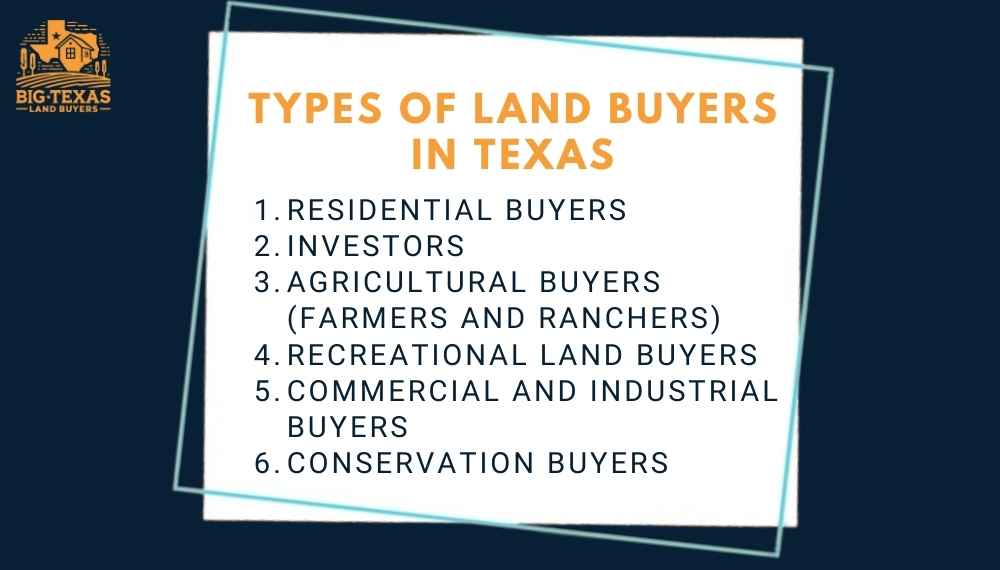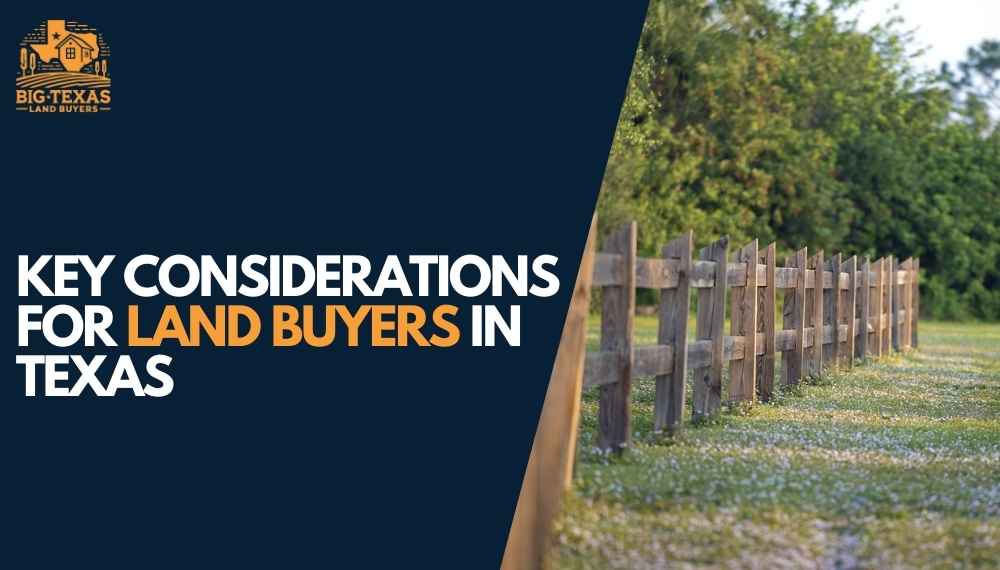Texas has long been associated with wide-open spaces, a rich agricultural history, and an expanding real estate market. With a land area of over 268,000 square miles, Texas presents endless opportunities for diverse land ownership. From sprawling ranches and fertile farmland to residential lots and commercial developments, the state offers a variety of land options to meet the needs of different types of buyers. However, to successfully navigate the Texas land market, it is crucial to understand the different categories of land buyers in Texas and their specific interests.
1. Types of Land Buyers in Texas

The Texas land market caters to a wide range of buyers, each with different objectives for purchasing land. The motivations for acquiring land can be financial, agricultural, recreational, or lifestyle-related. Here, we break down the most common types of land buyers in Texas:
Residential Buyers
One of the largest segments of land buyers in Texas is residential buyers. These individuals or families are typically looking for land to build a home, whether it be a primary residence, vacation home, or a custom-built dream house in a rural area. With Texas’s booming economy and steady population growth, more people are seeking opportunities to buy land in suburban or rural areas to escape the crowded urban centers.
- Motivations: Residential buyers are driven by the desire for space, privacy, and the freedom to build custom homes. Many seek to own larger plots of land with room for gardens, outdoor activities, or even small-scale farming.
- Preferred Locations: Buyers looking for residential land are often attracted to areas near major cities like Austin, Dallas, Houston, and San Antonio. Suburban areas surrounding these metropolitan regions have seen increased demand as people seek to be close to job opportunities while enjoying a more relaxed, rural lifestyle.
- Trends: Since the COVID-19 pandemic, there has been an increased interest in rural properties and suburban lots, as many people have shifted to remote work and seek more space for outdoor activities.
Investors
Investors represent a significant portion of land buyers in Texas, driven by the potential for long-term appreciation and return on investment. These buyers are typically looking for land that can increase in value over time or generate immediate income. Investment buyers can range from individuals seeking to diversify their portfolios to institutional investors, hedge funds, and land development companies.
- Motivations: Investors are primarily focused on the financial returns from land ownership. They may be interested in buying undeveloped land in growing areas, leasing land for agricultural use, or purchasing land that can be subdivided and sold for a profit. Many investors buy land in anticipation of future development, particularly in rapidly expanding urban corridors.
- Preferred Locations: Investment buyers often focus on land located near expanding cities and major highways. Central Texas, particularly the areas between Austin and San Antonio, has seen a surge in investment activity due to strong population growth and economic development. Investors are also interested in land near emerging technology and industrial hubs.
- Trends: Investors are increasingly looking at land as a hedge against inflation and as a long-term asset that provides security. Some investors are also targeting land for renewable energy projects, such as solar farms and wind farms, due to the growing demand for clean energy.
Agricultural Buyers (Farmers and Ranchers)
Agriculture is a central part of Texas’s identity, and farmers and ranchers remain key land buyers in the state. Agricultural buyers seek land for farming crops, raising livestock, or establishing large-scale ranch operations. Texas’s fertile soil, favorable climate, and expansive rural areas make it a prime location for various agricultural activities.
- Motivations: Farmers and ranchers typically purchase land for operational use, such as growing crops, grazing cattle, or establishing a family farm. Many buyers are also interested in acquiring additional acreage to expand their existing farming or ranching operations.
- Preferred Locations: Agricultural buyers are often drawn to areas known for fertile soil and good access to water. Central Texas, East Texas, and the Panhandle are known for large-scale farming and ranching activities. South Texas is also popular for citrus farming, while the Hill Country attracts ranchers due to its scenic landscapes and vast open spaces.
- Trends: There is a growing trend among younger generations of farmers and ranchers who are embracing sustainable agriculture and organic farming practices. Additionally, some buyers are diversifying their operations by incorporating agrotourism, such as hosting events, farm stays, or offering educational tours.
Recreational Land Buyers
Texas’s diverse landscapes, which include forests, lakes, rivers, and rolling hills, make it a popular destination for recreational land buyers. Land buyers in Texas are primarily interested in purchasing land for outdoor activities such as hunting, fishing, camping, or building vacation cabins.
- Motivations: Recreational land buyers seek land that offers opportunities for outdoor enjoyment. Many are hunting enthusiasts, nature lovers, or families looking for a weekend retreat. Recreational buyers often purchase land that offers natural beauty, wildlife, and seclusion from urban life.
- Preferred Locations: The Piney Woods region of East Texas, the Hill Country, and the South Texas brush country are among the most popular destinations for recreational land buyers. These areas offer abundant wildlife, scenic landscapes, and proximity to water sources.
- Trends: Recreational land buyers are increasingly looking for properties that offer multiple outdoor activities, such as hiking, fishing, and boating. Many buyers are also interested in conservation practices and managing the land to preserve natural habitats and support wildlife populations.
Commercial and Industrial Buyers
Texas’s strong economic growth has made it a prime location for commercial and industrial land buyers. These buyers are typically developers, corporations, or business owners seeking land for commercial projects such as retail centers, office buildings, warehouses, or manufacturing facilities.
- Motivations: Commercial buyers are driven by business needs and the potential for generating income through commercial or industrial ventures. With Texas being a business-friendly state, many companies are expanding their operations or relocating to Texas, creating strong demand for commercial land.
- Preferred Locations: Commercial and industrial buyers tend to focus on land near major transportation hubs, highways, and urban centers. The Dallas-Fort Worth metroplex, Houston area, and Austin-San Antonio corridor are hot spots for commercial real estate development.
- Trends: As Texas continues to attract technology companies, healthcare institutions, and industrial manufacturers, the demand for commercial land in key regions is expected to grow. Additionally, with the rise of e-commerce, industrial land buyers are seeking locations suitable for distribution centers and logistics hubs.
Conservation Buyers
Conservation buyers are a unique group of land purchasers motivated by environmental stewardship and the desire to preserve natural resources. These buyers often seek land for conservation purposes, such as protecting wildlife habitats, preserving open spaces, or safeguarding water resources.
- Motivations: Conservation buyers are typically focused on protecting the land from development or degradation. Many are individuals, environmental organizations, or government agencies that acquire land for conservation easements, reforestation, or habitat restoration.
- Preferred Locations: Conservation buyers are interested in ecologically sensitive areas such as wetlands, forests, riverbanks, and prairies. East Texas, with its dense forests and biodiversity, is a popular location for conservation efforts. Additionally, land near rivers, lakes, and coastal areas is highly sought after for environmental protection.
- Trends: As awareness of climate change and environmental degradation grows, more buyers are seeking to purchase land for conservation purposes. Conservation easements, which allow land to remain undeveloped while providing tax benefits to the owner, have become an increasingly popular option.
2. Key Considerations for Land Buyers in Texas

When purchasing land in Texas, buyers must carefully evaluate several factors to ensure the property meets their needs and goals. Here are some key considerations that all types of land buyers should keep in mind:
Zoning and Land Use Restrictions
Before purchasing land, buyers should investigate zoning regulations and land use restrictions that may impact their intended use of the property. Local zoning laws can dictate whether the land can be used for residential, commercial, agricultural, or recreational purposes. Understanding these regulations is essential to avoid legal complications or limitations on future development.
Water Rights and Access
Water is a crucial resource, especially in Texas, where droughts and water scarcity are common in certain regions. Buyers should research the availability of water sources on the property, such as wells, ponds, or access to municipal water supplies. Additionally, buyers should investigate water rights and permits, as these can impact agricultural operations or future development.
Soil Quality and Topography
For agricultural and ranching buyers, soil quality and topography are critical factors that influence the land’s productivity. Conducting soil tests and assessing the land’s terrain will help determine whether the property is suitable for farming, grazing, or other agricultural activities.
Infrastructure and Accessibility
Land that is accessible via roads, highways, and utilities is generally more valuable and easier to develop. Buyers should consider whether the land has existing infrastructure such as electricity, water, sewer, and road access. Remote properties may require additional investments in infrastructure, which can add to the cost of ownership.
Market Trends and Future Development
Land buyers should stay informed about market trends and potential future development in the area. Buying land in a region experiencing rapid population growth or economic expansion can lead to significant appreciation in value.
The Texas Land Buying Process
The process of buying land in Texas involves several important steps:
- Research: Buyers should start by researching the market and identifying regions that align with their goals.
- Due Diligence: Conducting due diligence is critical to ensure the land meets the buyer’s needs. This includes reviewing zoning laws, land surveys, water rights, and environmental assessments.
- Financing: Land buyers may seek financing through traditional lenders, Farm Credit institutions, or owner financing arrangements.
- Closing: Once a buyer has made an offer, the closing process typically involves signing the purchase agreement, transferring the deed, and completing any necessary legal documentation.
4. Conclusion
The Texas land market offers something for every type of buyer, from residential homeowners and agricultural operators to investors, recreational enthusiasts, and conservationists. Understanding the motivations, preferences, and considerations of each buyer segment is key to making informed decisions in the Texas land market.
Whether you’re buying land for personal use, investment, or preservation, Texas’s diverse landscapes, strong economy, and growing population present exciting opportunities. By carefully evaluating factors like zoning, water rights, soil quality, and market trends, land buyers in Texas can find the perfect piece of land to meet their objectives and secure a valuable asset for the future.
Follow us:

